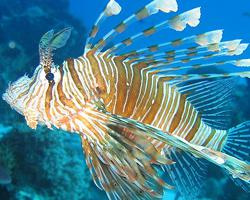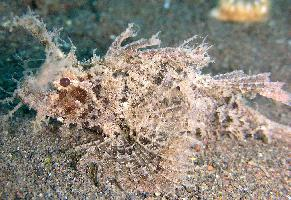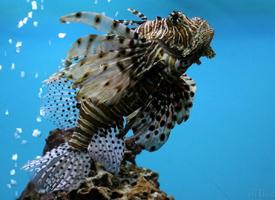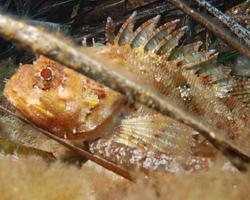
Starea de conservare
| Amenințat |
Descrierea animalului
The devil firefish, scientifically known as Pterois miles, is a captivating and visually stunning species of marine fish that belongs to the Scorpaenidae family. This creature is more commonly referred to as the common lionfish, a name it shares with its close relative, Pterois volitans. The devil firefish is native to the Indian Ocean, including the Red Sea and the eastern coast of Africa, extending to the western Pacific Ocean.Appearance-wise, the devil firefish is renowned for its striking coloration and dramatic fin display. It typically boasts a combination of white to cream-colored hues with numerous vertical, evenly spaced, dark brown to maroon stripes that adorn its body. This contrasting pattern serves as a form of camouflage, helping it to blend in with the surrounding coral and rocky substrates of its natural habitat.
The most distinctive feature of the devil firefish is its impressive array of elongated dorsal fin spines. These spines are long, feathery, and venomous, serving as a formidable defense mechanism against potential predators. The fish has 13 of these dangerous spines, each connected to a venom gland, capable of delivering a painful sting that can cause severe reactions in humans and other animals. Beneath the dorsal spines are soft, fan-like pectoral fins, which are usually spotted or banded and are primarily used for maneuvering in the water rather than propulsion.
The devil firefish has a relatively stocky body with a large head and mouth that enables it to suck in and swallow prey whole. Its eyes are set high on the head and are adapted for keen vision, which aids in hunting. The fish's mouth is capable of a surprising range of motion, and its sharp teeth can easily grasp and hold onto slippery prey.
In terms of size, the devil firefish can grow up to 38 centimeters (15 inches) in length, though most individuals are smaller. It is a carnivorous species, preying on a variety of small fish, shrimp, and other crustaceans. It uses its expansive, undulating pectoral fins to corner and trap prey before consuming it.
The devil firefish is a solitary creature and is known to be territorial, often found lurking in crevices and overhangs during the day. At night, it becomes more active and ventures out to hunt. It is a popular species in the aquarium trade due to its striking appearance, but its venomous spines make it a challenging and potentially dangerous pet.
The introduction of the devil firefish into non-native waters, particularly along the East Coast of the United States, the Caribbean, and parts of the Gulf of Mexico, has caused ecological concerns. As an invasive species, it has few natural predators and can outcompete native fish for food and habitat, leading to significant disruptions in local marine ecosystems.
In summary, the devil firefish (Pterois miles) is a fascinating and beautiful marine species, recognized for its unique appearance and venomous defenses. Despite its allure, it poses challenges both for aquarists who keep it and for ecosystems where it has been introduced as an invasive species.
Animale similare
Fotografii noi cu animale
Top 10 animale
- Dolphin gull (Leucophaeus scoresbii)
- Diana monkey (Cercopithecus diana)
- Moustached guenon (Cercopithecus cephus)
- Greek tortoise (Testudo graeca)
- Stone loach (Barbatula barbatula)
- Galápagos tortoise (Geochelone nigra complex)
- Japanese macaque (Macaca fuscata)
- Russian tortoise (Testudo horsfieldii)
- Common flying dragon (Draco volans)
- Galápagos penguin (Spheniscus mendiculus)


